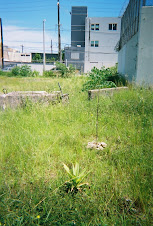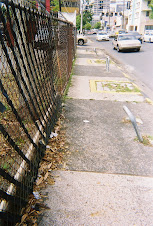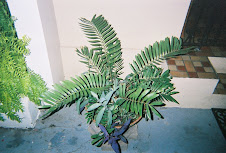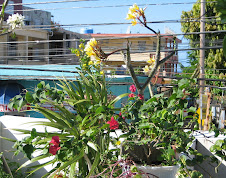ago the Tamarindus indica, not far from the first tree shown at the right in the pictures
below. I recommend to take advantage of softer soil, easier digging a day or two after it has rained, if you decide to plant anything in the guerrilla gardening manner, as discussed here or in guerrillagardening.com from London.
The mentioned walls are the constant wordy bombardment about global warming, CO2, petitions, marches, conferences to gather and chat, talk and network, crocodile
tears. All this movement, may be fine in the first world, those countries in which democratic principles are respected. Countries where a real state of law exists in which the judicial branch respects and enforces the law. Sorry folks! What we got in Puerto Rico, USA, the isle of concrete asphalt is a is a caricature, a grotesque one, evident in their speeches, writing of laws for the hell of it. LAWS that no one will ever enforce.
That is why I refuse to follow the mass in the environmental talking, make believe, moving in a vacuum from the computer at home or in the office. I reiterate one thing: Education for children regarding the environment is a waste of money and effort since adults, the free enterprise destroys legally, or through bribes, everything that involves it in a short or long run, all Flora/Fauna, water and soil.
THANKSGIVING BONUS
from
Botany for Gardeners
by
Brian Capon
from
Botany for Gardeners
by
Brian Capon
The progress of a plant's growth is a summation of its responses to separate, butinteracting components of the environment in which it is living. The plant may be favored with adequate water and optimum temperatures but be limited in its ability to photosynthesize by inadequate illumination, perhaps because of shading from taller plants or buildings. Another
plant may receive full sunlight, plentiful irrigation and sufficient fertilizer, but still not express
its growth potential because prevailing temperatures are too high or too low. Even if climatic
and soil conditions are ideal, stunting may occur because pathogenic fungi or predatory insects
have invaded the plant. Microorganisms and animals are, indeed environmental factors to be
reckoned with. Other life forms, being ordained components of habitats occupied by plants, exercise both beneficial and harmful effects, as do temperature, rainfall, sunlight, etc.
IT becomes obvious that, out of a host of interacting environmental factors, only one need challenge a plant's tolerances in order to limit its growth. The greater the number of unfavorable conditions, acting in concert, the more profound the effect. That is why, in nature where so many
variables are at work, plants rarely reach their full potential. Happily in a garden, one has the opportunity to improve on a few factors limiting plant development and , consequently, to cultivate larger, healthier specimens than casually occur in the wild.
Plants generally die when too many limiting factors overwhelm their physiological capabilities for survival. Or, on the other hand, they may simply succumb to "old age" processes, principally to a
genetically-programmed deterioration of cells and tissues, called senescence (Latin, "to grow old"). Once this process has been initiated, even the best care cannot save a plant. In annual species, senescence takes place within one year of growth; in biennials, in the second year. In perennial species, senescence of a localized nature occurs in older organs before they die and
are discarded; it takes many years before the process consumes the entire organism.
plant may receive full sunlight, plentiful irrigation and sufficient fertilizer, but still not express
its growth potential because prevailing temperatures are too high or too low. Even if climatic
and soil conditions are ideal, stunting may occur because pathogenic fungi or predatory insects
have invaded the plant. Microorganisms and animals are, indeed environmental factors to be
reckoned with. Other life forms, being ordained components of habitats occupied by plants, exercise both beneficial and harmful effects, as do temperature, rainfall, sunlight, etc.
IT becomes obvious that, out of a host of interacting environmental factors, only one need challenge a plant's tolerances in order to limit its growth. The greater the number of unfavorable conditions, acting in concert, the more profound the effect. That is why, in nature where so many
variables are at work, plants rarely reach their full potential. Happily in a garden, one has the opportunity to improve on a few factors limiting plant development and , consequently, to cultivate larger, healthier specimens than casually occur in the wild.
Plants generally die when too many limiting factors overwhelm their physiological capabilities for survival. Or, on the other hand, they may simply succumb to "old age" processes, principally to a
genetically-programmed deterioration of cells and tissues, called senescence (Latin, "to grow old"). Once this process has been initiated, even the best care cannot save a plant. In annual species, senescence takes place within one year of growth; in biennials, in the second year. In perennial species, senescence of a localized nature occurs in older organs before they die and
are discarded; it takes many years before the process consumes the entire organism.
EDITORS NOTE
As an example, the GAIA guys/gals invited
me ten times to volunteer, for marches, to sign
petitions. I offered an exchange.
Provide me with two volunteers with hand pruners,
to prune correctly guerrilla fashion some trees of the hundreds
available in the Ponce de Leon Avenue.
You guessed right! No response, silence, water and salt.
Time to go.
As an example, the GAIA guys/gals invited
me ten times to volunteer, for marches, to sign
petitions. I offered an exchange.
Provide me with two volunteers with hand pruners,
to prune correctly guerrilla fashion some trees of the hundreds
available in the Ponce de Leon Avenue.
You guessed right! No response, silence, water and salt.
Time to go.


















-25.jpg)
-24.jpg)




































-22.jpg)
-25.jpg)
-24.jpg)






-16.jpg)
-13.jpg)
-08.jpg)

















































4 comentarios:
te inventaste tu propio award. Eso es trendsetting! Ja, issues my friend. You're good!!!!!!!!!!!!
El soberano, cansado de ver blogs
agrupados bajo el Lame Ducks Blog Guild, dandose no 1 sino2,3 y 4 premios por
unos limitados por su INSULARISMO, batatario, tomo las riendas por los cuernos, o son los cuernos por el toro,
otorgando este inmerecido, pero original premio.
Gracias Javier sea quien seas, y donde estes, por tus palabras. Quel pueblo DECIDRA!
Antigonum Cajan,
Felicidades por el premio. Saludos.
Don Segundo y Doña Bianca
Donha Bianca y Don Segundo,
Agradecido por su visita.
Publicar un comentario